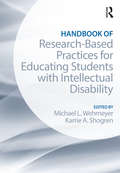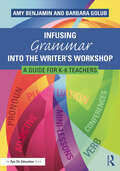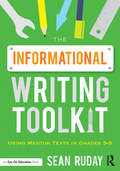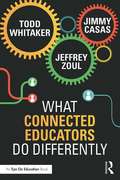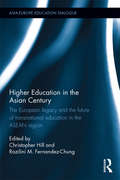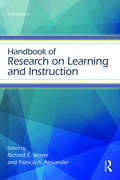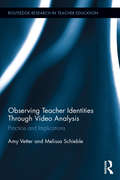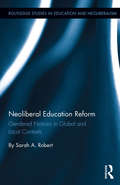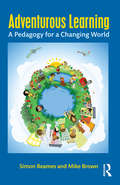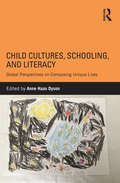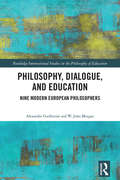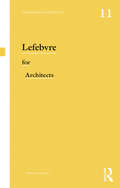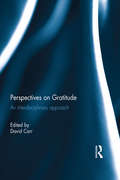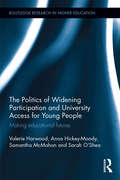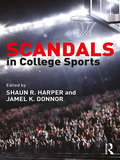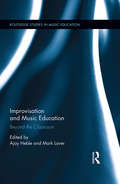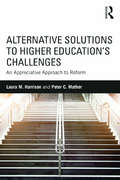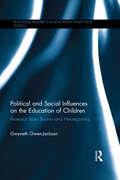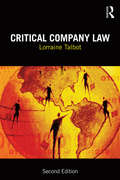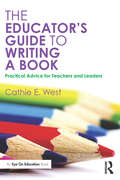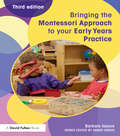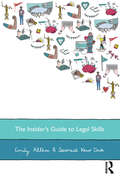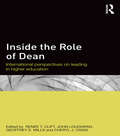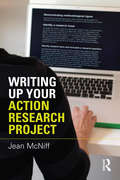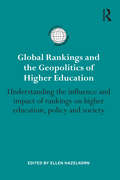- Table View
- List View
Handbook of Research-Based Practices for Educating Students with Intellectual Disability
by Michael L. Wehmeyer Karrie A. ShogrenThe Handbook of Research-Based Practices for Educating Students with Intellectual Disability provides an integrated, transdisciplinary overview of research-based practices for teaching students with intellectual disability. This comprehensive volume emphasizes education across life stages, from early intervention in schools through the transition to adulthood, and highlights major educational and support needs of children and youth with intellectual disability. The implications of history, recent research, and existing information are positioned to systematically advance new practices and explore promising possibilities in the field. Driven by the collaboration of accomplished, nationally recognized professionals of varied approaches and philosophies, the book emphasizes practices that have been shown to be effective through multiple methodologies, so as to help readers select interventions based on the evidence of their effectiveness.
Infusing Grammar Into the Writer's Workshop: A Guide for K-6 Teachers
by Amy Benjamin Barbara GolubHelp your students improve their language skills and become stronger readers and writers. In this timely book, literacy experts Amy Benjamin and Barbara Golub offer best practices for fortifying the writer’s workshop model with meaningful, relevant instruction in grammar. The book answers questions such as… What does a writer’s workshop look like and how does it fit into balanced literacy models? How does grammar fit into a writer’s workshop? How can you use natural language acquisition to transition children from non-Standard to Standard English patterns? How can you teach students to identify a complete sentence? What are effective ways to teach parts of speech? How can you build on nouns and verbs to teach adjectives, adverbs, prepositional phrases, and dependent clauses? In each chapter, you’ll find out exactly what teaching the targeted concept looks like in a workshop classroom. Examples are provided for different grade levels and can be adapted as necessary to meet your needs. This book is a No-Worksheet Zone. You’ll learnhow to present grammar using authentic text and talk, leading to more durable learning.
The Informational Writing Toolkit: Using Mentor Texts in Grades 3-5
by Sean RudayIn order for students to write effective informational texts, they need to read good informational texts! In this practical book, you’ll find out how to use high-quality books and articles to make writing instruction more meaningful, authentic, and successful. The author demonstrates how you can help students analyze the qualities of effective informational texts and then help students think of those qualities as tools to improve their own writing. The book is filled with examples and templates you can bring back to the classroom immediately. Special Features: Offers clear suggestions for meeting the Common Core informational writing standards Covers all aspects of informational writing, including introducing and developing a topic; grouping related information together; adding features that aid comprehension; linking ideas; and using precise language and domain-specific vocabulary Includes a variety of assessment strategies and rubrics Provides classroom snapshots to show the writing tools in action Comes with a variety of templates and tools that can be photocopied or downloaded and printed from our website, www.routledge.com/books/details/9781138832060 Bonus! The book includes an annotated bibliography—a comprehensive list of recommended informational texts, with suggestions for how to use them.
What Connected Educators Do Differently
by Todd Whitaker Jeffrey Zoul Jimmy CasasTodd Whitaker, Jeffrey Zoul, and Jimmy Casas are widely acclaimed experts on teaching and leading and are pioneers in the education twitterverse, and now they are sharing their best practices! In What Connected Educators Do Differently, they show how being a connected educator—by using social media to connect with peers across the country and even across the globe—will greatly enhance your own learning and your success in a school or classroom. You’ll find out how to create a personal and professional learning network to share resources and ideas, gain support, and make an impact on others. By customizing your professional development in this way, you’ll be able to learn what you want, how you want, when you want. Best of all, you’ll become energized and inspired by all the great ideas out there and how you can contribute, benefiting both you and your students. Whether you are a teacher or school leader, you will come away from this book with step-by-step advice and fresh ideas to try immediately. Being a connected educator has never been easier or more important than it is right now!
Higher Education in the Asian Century: The European legacy and the future of Transnational Education in the ASEAN region (Asia-Europe Education Dialogue)
by Christopher Hill Rozilini M. Fernandez-ChungThere is increasing interest in the Asian arena; both as a home for the delivery of international higher education and as a breeding ground for a new brand of sustainable domestic and international growth. Academics are increasingly turning to Asia and Asian Education in order to better understand and predict the emerging trends of global education and this book will serve to provide a forum for debate of this nature. The book provides an insight into the interplay of Asian and European education, identifies the key areas for further development and firmly grounds the approach as one of conversation and dialogue, rather than one-sided dictation. It also highlights the critical issues within the development of international education, discusses the value and challenges of existing TNE practices as a mechanism to respond to the emerging Asian needs and provides an insight into the future direction of education in the Asian century.
Handbook of Research on Learning and Instruction (Educational Psychology Handbook)
by Richard E. Mayer Patricia A. AlexanderDuring the past 30 years, researchers have made exciting progress in the science of learning (i.e., how people learn) and the science of instruction (i.e., how to help people learn). This second edition of the Handbook of Research on Learning and Instruction is intended to provide an overview of these research advances. With chapters written by leading researchers from around the world, this volume examines learning and instruction in a variety of learning environments including in classrooms and out of classrooms, and with a variety of learners including K-16 students and adult learners. Contributors to this volume demonstrate how and why educational practice should be guided by research evidence concerning what works in instruction. The Handbook is written at a level that is appropriate for graduate students, researchers, and practitioners interested in an evidence-based approach to learning and instruction. The book is divided into two sections: learning and instruction. The learning section consists of chapters on how people learn in reading, writing, mathematics, science, history, second language, and physical education, as well as how people acquire the knowledge and processes required for critical thinking, studying, self-regulation, and motivation. The instruction section consists of chapters on effective instructional methods—feedback, examples, questioning, tutoring, visualizations, simulations, inquiry, discussion, collaboration, peer modeling, and adaptive instruction. Each chapter in this second edition of the Handbook has been thoroughly revised to integrate recent advances in the field of educational psychology. Two chapters have been added to reflect advances in both helping students develop learning strategies and using technology to individualize instruction. As with the first edition, this updated volume showcases the best research being done on learning and instruction by traversing a broad array of academic domains, learning constructs, and instructional methods.
Observing Teacher Identities through Video Analysis: Practice and Implications (Routledge Research in Teacher Education)
by Amy Vetter Melissa SchiebleTeaching is often seen as an identity process, with teachers constructing and enacting their identities through daily interactions with students, parents and colleagues. This volume explores how conducting video analysis helps teachers gain valuable perspectives on their own identities and improve classroom practice over time. This form of interactional awareness fosters reflection and action on creating classroom conditions that encourage equitable learning. The volume follows preservice English teachers as they examine video records of their practice during student teaching, and how the evidence impacts their development as literacy teachers of diverse adolescents. By applying an analytic framework to video analysis, the authors demonstrate how novice teachers use positioning theory to transform their own identity performance in the classroom. Education scholars, teachers and professional developers will greatly benefit from this unique perspective on teacher identity work.
Neoliberal Education Reform: Gendered Notions in Global and Local Contexts (Routledge Studies in Education, Neoliberalism, and Marxism)
by Sarah A. RobertThe restructuring of teaching is a global issue, the result of a transnational movement of policy. Gender shapes the occupational reform and binds the global-to-the-local movement of reform ideas. Gender is also implicated in how policy is done and how it leads to particular outcomes. This volume examines the behind-the-scenes work done to make sense of reform and implement it during the workday and questions the new forms and controls over teaching reforms—the labor process—revealed to understand the implications of neoliberal education reform on teachers’ work. Based on ethnographic research undertaken at public high schools in Argentina, this volume introduces the everyday work lives of teachers. It includes interviews and observations revealing what it means to be a teacher in the reform context, and explores the ways masculinities and femininities shape teachers’ decision-making about reforms. At a time when teachers are at the center of political controversy around the world, this volume is an important reminder that school change is about changing the work of teachers.
Adventurous Learning: A Pedagogy for a Changing World
by Mike Brown Simon BeamesAdventurous Learning interrogates the word ‘adventure’ and explores how elements of authenticity, agency, uncertainty and mastery can be incorporated into educational practices. It outlines key elements for a pedagogy of adventurous learning and provides guidelines grounded in accessible theory. Teachers of all kinds can adapt these guidelines for indoor and outdoor teaching in their own culturally specific, place-responsive contexts, without any requirement to learn a new program or buy an educational gimmick. As forces of standardization and regulation continue to pervade educational systems across the globe, both teaching and learning have been starved of creativity, choice and ‘real world’ relevance. Many teachers are keen to improve their practice yet feel constrained by the institutional structures within which they work. By carefully examining adventure and its role in education, teachers can become better able to design and deliver engaging programmes that are underpinned by sound pedagogical principles, and which have deep and enduring meaning for their students.
Child Cultures, Schooling, and Literacy: Global Perspectives on Composing Unique Lives
by Anne Haas DysonThrough analysis of case studies of young children (ages 3 to 8 years), situated in different geographic, cultural, linguistic, political, and socioeconomic sites on six continents, this book examines the interplay of childhoods, schooling, and, literacies. Written language is situated within particular childhoods as they unfold in school. A key focus is on children’s agency in the construction of their own childhoods. The book generates diverse perspectives on what written language may mean for childhoods. Looking at variations in the complex relationships between official (curricular) visions and unofficial (child-initiated) visions of relevant composing practices and appropriate cultural resources, it offers, first, insight into how those relationships may change over time and space as children move through early schooling, and, second, understanding of the dynamics of schools and the experience of childhoods through which the local meaning of school literacy is formulated. Each case—each child in a particular sociocultural site—does not represent an essentialized nation or a people but, rather, a rich, processual depiction of childhood being constructed in particular local contexts and the role, if any, for composing.
Philosophy, Dialogue, and Education: Nine Modern European Philosophers (Routledge International Studies in the Philosophy of Education)
by Alexandre Guilherme W. John MorganPhilosophy, Dialogue, and Education is an advanced introduction to nine key European social philosophers: Martin Buber, Mikhail Bakhtin, Lev Vygotsky, Hannah Arendt, Emmanuel Levinas, Maurice Merleau-Ponty, Simone Weil, Michael Oakeshott, and Jürgen Habermas. This detailed yet highly readable work positions the socio-political views of each philosopher within a European tradition of dialogical philosophy; and reflects on the continuing theoretical relevance of the work of each to education generally and to critical pedagogy. The discussion in each chapter is informed by materials drawn from various scholarly sources in English and is enriched by materials from other languages, particularly French, German, and Russian. This enhances the comparative European cultural perspective of the book; and connects the work of each philosopher to wider intellectual, political, and social debates. The book will appeal to academics, postgraduates, and researchers working in philosophy, philosophy of education, and in educational, cultural, and social studies more generally. Advanced undergraduate students would also benefit from the book’s discussion of primary sources and the authors’ suggestions for further reading.
Lefebvre for Architects (Thinkers for Architects)
by Nathaniel ColemanWhile the work of Henri Lefebvre has become better known in the English-speaking world since the 1991 translation of his 1974 masterpiece, The Production of Space, his influence on the actual production of architecture and the city has been less pronounced. Although now widely read in schools of architecture, planning and urban design, Lefebvre’s message for practice remains elusive; inevitably so because the entry of his work into the Anglosphere has come with repression of the two most challenging aspects of his thinking: romanticism and Utopia, which simultaneously confront modernity while being progressive. Contemporary discomfort with romanticism and Utopia arguably obstructs the shift of Lefebvre’s thinking from being objects of theoretical interest into positions of actually influencing practices. Attempting to understand and act upon architecture and the city with Lefebvre but without Utopia and romanticism risks muting the impact of his ideas. Although Utopia may seem to have no place in the present, Lefebvre reveals this as little more than a self-serving affirmation that ‘there is no alternative’ to social and political detachment. Demanding the impossible may end in failure but as Lefebvre shows us, doing so is the first step towards other possibilities. To think with Lefebvre is to think about Utopia, doing so makes contact with what is most enduring about his project for the city and its inhabitants, and with what is most radical about it as well. Lefebvre for Architects offers a concise account of the relevance of Henri Lefebvre’s writing for the theory and practice of architecture, planning and urban design. This book is accessible for students and practitioners who wish to fully engage with the design possibilities offered by Lefebvre’s philosophy.
Perspectives on Gratitude: An interdisciplinary approach
by David CarrPsychologists, philosophers, theologians and educationalists have all lately explored various conceptual, moral, psychological and pedagogical dimensions of gratitude in a rapidly expanding academic and popular literature. However, while the distinguished contributors to this work hail from these distinct disciplines, they have been brought together in this volume precisely in recognition of the need for a more interdisciplinary perspective on the topic. While further developing such more familiar debates in the field as whether it is appropriate to feel grateful in circumstances in which there is no obvious benefactor, whether it is proper to feel grateful to those who have benefited one only from a sense of duty and whether it makes sense to be grateful if so doing colludes with injustice, the essays in this collection explore a wide variety of fresh conceptual, psychological and moral issues. For example, in addition to identifying some new moral paradoxes about gratitude and seeking a generally more morally discriminating approach to gratitude education, relations are explored between gratitude and humility, forgiveness and appreciation and the religious and spiritual dimensions of the concept are also given much overdue attention. By drawing together serious academic engagement with the study of gratitude and a serious attempt to undertake this within an interdisciplinary perspective, Perspectives on Gratitude will be of value to academics and graduate students in the fields of philosophy, psychology and theology, as well as other research-based disciplines.
The Politics of Widening Participation and University Access for Young People: Making educational futures (Routledge Research in Higher Education)
by Valerie Harwood Anna Hickey-Moody Samantha McMahon Sarah O'SheaYoung people with tenuous relationships to schooling and education are an enduring challenge when it comes to addressing social inclusion, yet their experiences remain overlooked in efforts to widen participation in higher education. The Politics of Widening Participation and University Access for Young People examines the existing knowledges and feelings these young people have about higher education, and, through the authors’ empirical research, demonstrates how sustained connections to educational futures can be created for them. Drawing from an empirical study with nearly three hundred young people who have precarious relationships to schooling and live in disadvantaged communities, this book offers new insights into their subjects’ experiences of educational disadvantages. It explains the different ways the university is constructed as impossible, undesirable, or even risky, by young people experiencing educational disadvantage. The book brings their stories into focus to offer new ways of thinking about the educational consequences of alienation from school. It shows how our understanding of the politics of experience of these young people has an important impact on our ability to develop appropriate means through which to engage them in higher education. This book challenges and significantly advances the popular frames for international debate on widening participation and the ethical right to educational participation in contemporary society. As such, it will be of be of key interest to academics, researchers and postgraduate students in the fields of higher education, sociology of education, anthropology of education, cultural studies of education, sociology as well as to those concerned by the impact of disadvantage on young people’s understandings of, and aspirations towards, education and attending university.
Scandals in College Sports: Legal, Ethical, And Policy Case Studies
by Shaun R. Harper Jamel K. DonnorThis timely book highlights the impact that sports have on institutions of higher education and guides college leaders and educators in informed discussions of policy and practice. Scandals in College Sports includes 21 classic and contemporary case studies and ethical dilemmas showcasing challenges that threatened the integrity and credibility of intercollegiate sports programs at a range of institutional types across the country. Cases cover NCAA policy violations and ethical dilemmas involving student-athletes, coaches, and other stakeholders, including scandals of academic misconduct, illegal recruiting practices, sexual assault, inappropriate sexual relationships, hazing, concussions, and point shaving. Each chapter author explores the details of the specific case, presents the dilemma in a broader sociocultural context, and ultimately offers an alternative ending to help guide future practice.
Improvisation and Music Education: Beyond the Classroom (Routledge Studies in Music Education)
by Ajay Heble Mark LaverThis book offers compelling new perspectives on the revolutionary potential of improvisation pedagogy. Bringing together contributions from leading musicians, scholars, and teachers from around the world, the volume articulates how improvisation can breathe new life into old curricula; how it can help teachers and students to communicate more effectively; how it can break down damaging ideological boundaries between classrooms and communities; and how it can help students become more thoughtful, engaged, and activist global citizens. In the last two decades, a growing number of music educators, music education researchers, musicologists, cultural theorists, creative practitioners, and ethnomusicologists have suggested that a greater emphasis on improvisation in music performance, history, and theory classes offers enormous potential for pedagogical enrichment. This book will help educators realize that potential by exploring improvisation along a variety of trajectories. Essays offer readers both theoretical explorations of improvisation and music education from a wide array of vantage points, and practical explanations of how the theory can be implemented in real situations in communities and classrooms. It will therefore be of interest to teachers and students in numerous modes of pedagogy and fields of study, as well as students and faculty in the academic fields of music education, jazz studies, ethnomusicology, musicology, cultural studies, and popular culture studies.
Alternative Solutions to Higher Education's Challenges: An Appreciative Approach to Reform
by Laura M. Harrison Peter C. MatherMoving beyond critique, Alternative Solutions to Higher Education’s Challenges uses an appreciative approach to highlight what is working in colleges and universities and offers an examination of how institutions can improve practice. Drawing on examples and cases from real higher education institutions, this book offers a solution-focused framework that challenges the negative assumptions that have plagued higher education. Chapters explore how current narratives have perpetuated and maintained systematic flaws in our education system and have hindered reform. This invaluable resource breaks from the substantial literature that only highlights the many problems facing higher education today, and instead provides alternative strategies and essential recommendations for moving higher education institutions forward.
Political and Social Influences on the Education of Children: Research from Bosnia and Herzegovina (Routledge Research in Education Policy and Politics)
by Gwyneth Owen-JacksonThis book investigates the effects of social and political change on the provision of primary education in post-communist and post-war contexts. Focusing on Bosnia and Herzegovina, the author considers educational developments in post-communist countries of central and Eastern Europe, the effects of the civil conflict that occurred 1992-95 and the consequences of the peace settlement. In order to present a picture of the development of primary education in Bosnia and Herzegovina and the importance of political ideology on education provision, chapters discuss instances of the impact of external political influences, educational provision being drawn from neighbouring countries, and illustrate how the political war is continuing. Political and Social Influences on the Education of Children provides insights into lessons learned for education in countries with a changing political state and considers what the future might hold for primary education provision in Bosnia and Herzegovina. Political and Social Influences on the Education of Childrenis key reading for researchers, scholars and postgraduate students interested in educational developments in post-communist countries and education in areas of conflict. This book will also appeal to those interested in the political and social history of the region.
Critical Company Law
by Lorraine TalbotThe second edition of Critical Company Law provides a framework in which to understand how the company functions in society and a thorough grounding in modern legal doctrine. It shows how modern company law is shaped by a multi-layered history of politics, ideology, economics and power. Through the lens of political economic theory the book shows how the company becomes the mechanism through which the state makes political choices about distributing societies’ wealth and through which it responds to economic crises. The current law reflects an economy marked by a disjuncture between the low profits of the productive economy and the high profits of the finance economy. Critical Company Law examines areas of company law to show how they reflect a fragile economy inexorably drawn to social and economic inequality and short-termism. These include: • The Doctrine of Separate Corporate Personality • Groups of Companies and Tort Liabilities • Company Formation and the Constitution • Directors’ Duties and Authority • Corporate Capacity • Shares and Shareholders • Raising and Maintaining Capital • Minority Protection In this uniquely hybrid book the legal topics are treated with detail and clarity, providing an engaging introduction to the key topics required for a student of company law.
The Educator's Guide to Writing a Book: Practical Advice for Teachers and Leaders
by Cathie E. WestThe Educator’s Guide to Writing a Book is for educators who dream of sharing their knowledge and skills with a broader audience. This exciting resource provides step-by-step guidance on how to set publishing goals, create well-written content and resource material, develop an informative yet accessible writing style, prepare professional level manuscripts, and anticipate each stage in the publishing process. Chapters include authentic writing examples, tips from veteran authors and publishing professionals, and supportive resources. The Educator’s Guide to Writing a Book is an invaluable guide that helps aspiring and novice authors move publishing goals from dreams to reality. .
Bringing the Montessori Approach to your Early Years Practice (Bringing ... to your Early Years Practice)
by Barbara IsaacsHave you ever wondered what the Montessori approach is all about and how it can be used to benefit the young children in your setting? This book explains how the Montessori approach works offering guidance on planning and assessment methods alongside practical activities for practitioners to try. Throughout there are practical examples involving children of different ages in a wide range of settings to show how Montessori principles have been implemented. . This new edition has been fully updated to include: The revised areas of learning in the EYFS and how these link to Montessori practice An examination of early effective learning Approaches to effective learning in Montessori settings A new chapter on Montessori approaches to the assessment requirements of the EYFSquestions for reflection This convenient guide will help early years practitioners, students and parents to really understand what the Montessori approach means to their setting and children.
The Insider’s Guide to Legal Skills
by Emily Allbon Sanmeet Kaur DuaConfused by cases? Stuck on statutes? Or just unsure where to start with writing, research or revision? The Insider’s Guide to Legal Skills will show you what you need to succeed, applying skills in their real-world context and helping you get to grips with legal method and thinking. Making use of problem-based learning and examples throughout, this practical and accessible guide will provide you with a clear guide to skills within the law degree and how to make the most of them in assessment, but also help you to see their importance to a future legal career. Designed for LLB/GDL students who want a clear overview of what a law degree is all about, the book has been built on the skills curriculum, and is a suitable text for Legal Skills, Methods and Reasoning courses as well as a general introduction to law, or pre-reading for those considering a law degree.
Inside the Role of Dean: International perspectives on leading in higher education
by John Loughran Renee T Clift Geoffrey E Mills Cheryl J CraigDespite deans playing critical roles in education, little is known about the knowledge, skills, and dispositions needed for the job, or the practical dilemmas they face on an almost daily basis. Each chapter of this international collection opens the role up for examination and critique, developing a deeper understanding of what it means to be a dean, and offering insights into the transition into the role, managing the daily demands and expectations of it, and what it means to exit the deanship. <P><P>The book brings being a dean and the leadership inherent in the position into sharp focus based on international perspectives on doing the job.
Writing Up Your Action Research Project
by Jean McNiffMany practice-based researchers have expert knowledge of doing research but often experience difficulties when writing it up and communicating the significance of what they have done. This book aims to help bridge the gap. Packed with practical advice and strong theoretical resources it takes you through the basics of designing and producing your text so that it will meet established standards and high quality assurance expectations. Divided into 3 distinctive parts, key points include: understanding writing practices engaging with the literatures how to write up a project report or dissertation how writing is judged in terms of professional and academic writing practices developing ideas for further study and publication Writing up Your Action Research Project is an essential text for practitioners on professional education and undergraduate courses across disciplines who want their writing to reflect the excellence of their research. It is the ideal companion to the author’s You and Your Action Research Project, now in its fourth edition.
Global Rankings and the Geopolitics of Higher Education: Understanding the influence and impact of rankings on higher education, policy and society (International Studies in Higher Education)
by Ellen HazelkornGlobal rankings and the Geopolitics of Higher Education is an examination of the impact and influence that university rankings have had on higher education, policy and public opinion in recent years. Bringing together some of the most informed authorities on this very complex issue, this edited collection of specially commissioned chapters examines the changes affecting higher education and the implications for society and the economy. Split into four interrelated sections, this book covers: The development of rankings in higher education, how they have impacted upon both the production of knowledge and its geography, and their influence in shaping policymaking. Overviews of the significance of rankings for higher education systems in Europe, Asia, Africa, Russia, South America, India and North America. An analysis of rankings in relation to key concerns that pervade contemporary higher education. Examination of the role rankings are likely to play in the future directions for higher education. This is a significant scholarly work that analyses in depth an important development in higher education systems, and which is likely to have an important influence upon how we understand the higher education policy-making process – past, present and future. It provides new analysis and conceptual understanding for researchers, and firm evidence for policy makers to use when addressing the value of rankings in measuring the quality of their institutions. Besides bringing together a powerful cast of academics, this book incorporates contributions from heads of important international higher education organisations – from both those involved in making and also in administering key decisions. This timely, reflective and accessible book forms crucial reading for those studying the subject of rankings, as well as the broader implications and unintended consequences of rankings on national higher education policies. Extending beyond academic researchers and students, this book will also be of significant interest to policymakers, higher education leaders and key stakeholders.
